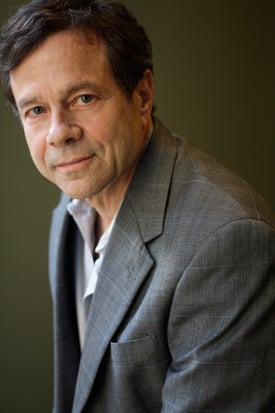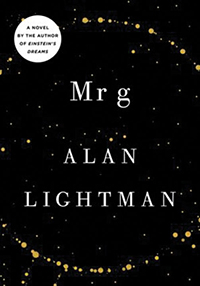
Alan Lightman is a professor of physics and humanities at MIT, and the author of novels, poems, and such essays as “The Accidental Universe: Science’s crisis of faith” (December 2011), which was selected as one of 2011’s best magazine features by New York Times columnist David Brooks. Lightman’s latest novel, Mr g (Pantheon), is a witty, playful work that describes what happens when the title character decides, after waking up from a nap, to create the universe. Harper’s Magazine put six questions to Lightman about the novel:
1. In a recent New York Times article, Dennis Overbye discusses the growing number of scientists, including Lawrence Krauss, Richard Dawkins, and Stephen Hawking, who have written about the “mystery of last resort”—the question of what came before the Big Bang to set creation in motion. Most of these writers have assiduously avoided the idea of intelligent design by a deity. In your Harper’s essay “The Accidental Universe,” which also touches on this aversion, you describe theoretical physics as “the outpost of science closest to philosophy, and religion,” and you’ve now published a novel written from the perspective of a God character. What kind of space do you think should exist in nonfiction scientific writing for faith? How do you think belief in a deity affects the pursuit of theoretical physics?
I think that scientific belief and faith, as faith is usually understood, operate in two different domains, with different realms of validity and meaning. (Except for the scientific belief that the laws of nature hold inviolable at every time and place in the universe, which is itself an article of faith.) Science cannot find the answers to such questions as whether it is acceptable to kill people in warfare or whether a particular painting by Rembrandt is “better” than a particular painting by Picasso; similarly, I do not think there is much place for scientific writing about faith.
As for belief in a deity, it should not affect the pursuit of theoretical physics, as long at that belief does not alter the demands of science that all theories be subject to experimental test and that all phenomena are governed by inviolable laws of nature. If a scientist decided to attribute a particular phenomenon to the unrepeatable and miraculous intervention of God, rather than to the workings of the laws of nature, and that attribution prevented the scientist from exploring the latter, then that would be a problem.
From Mr g:
I should mark this one, I said, so that it will not get lost among the others. I pinched the universe very slightly, making a small dip in its middle. Interrupted in its flight and caught, the thing sat there quietly.
We must give it a name, said Uncle Deva. Everything has a name. Something with a lilt. Something pretty. Why not call it Amrita. Or Anki. Or Aalam.
Oh mush, said Aunt Penelope. You’re being sentimental. And you can’t name an entire universe anyway.
Of course you can, said Uncle. A name expresses its essence. A name gives a thing character, personality.
But a universe doesn’t have a personality, said Aunt. As I understand it, a universe is a… well, a totality. A universe is everything that is, as far as the inside of the thing.
But we’re on the outside, said Uncle Deva.
If we have to name it, said my aunt, at least call it a number, not one of those mushy things you said.
A number! cried Uncle. That’s so impersonal. Numbers are so remote. What do you say, Nephew?
I looked at the pinched cosmos, still held firmly by my aunt as if she were afraid it might go whizzing off any moment. It seemed pretty featureless to me. But perhaps it would grow into its name. All right, I said. I’ll call it Aalam-104729. So be it.
2. The characters in Mr g are remarkable for their human-ness; they are not what one would expect from the family of God. The title character’s Uncle Deva and Aunt Penelope, who quarrel and disagree, are more reminiscent of Greek or Norse myth than of the Judeo-Christian tradition, and Mr g himself, while omnipotent, is neither omniscient nor infallible: He makes mistakes, changes his mind, learns from trial and error, and doesn’t foresee every consequence of his actions. The end result is that we see God as almost childlike, learning as he goes along and being lectured by his elders. Why did you want your god characters to be more ordinary than divine?
This is literature, not theology, and as a writer I want my readers to become emotionally involved with the characters. Hence, they must have human qualities. Mr g differs substantially from the gods of most religions in that he is a modest fellow, but although he listens to his elders, he doesn’t always follow their advice; he makes up his own mind about things. And, although he does learn by trial and error, I do not feel that he is childlike. He takes great pleasure in some of his creations and experiments, just as all of us do.
As for Uncle Deva and Aunt Penelope, there is clearly no antecedent for them in the Judeo-Christian tradition. But their interactions with Mr g bring out his character, and their own dialectic reflects the yin and yang of certain ideas: quantitative versus qualitative, rational versus intuitive.
3. Mr g creates many universes, then chooses one of them, Aalam-104729, as the one upon which he will experiment. He gives it three dimensions and three fundamental laws, then leaves the universe and its many worlds to develop on their own. One of the unintended consequences is the creation—a few “logical syllogisms” on from the creation of time and space and matter—of Belhor, the Devil-figure of the book’s cosmology. He serves an important function as an interlocutor and intellectual sparring partner who frequently manages to make Mr g rethink his opinions. While Belhor is sinister, however, he never seems evil or traditionally “devilish.” What made you decide to frame the relationship between Mr g and Belhor in this way, as one almost of equals, rather than opposites?
My Belhor is modeled in part on Mikhail Bulgakov’s wonderful Satan character in The Master and Margarita. Woland combines maliciousness with decency, seriousness with humor, dignity with playfulness. Also, he is neither all good nor all evil, and I liked his high intelligence. Mr g becomes a more interesting character when challenged by someone who is his intellectual equal. In his struggles to understand and frame responses to the difficult questions posed by Belhor, we not only see more deeply into Mr g’s character, we better appreciate the complexity of the questions.
4. The creator of this universe is affected by his creation, as are most writers, scientists, and creators. How did conceiving and writing the novel affect your own understanding of the relationship between faith, science, and philosophy?
What I learned in writing this novel is the complicated nature of moral questions. Does evil have to exist in order to have good? Does free will have to exist in order to have good? These questions, of course, do not have easy answers, and perhaps no answers at all, and I came to appreciate their complexity and ambiguity more in the exchanges between Mr g and Belhor. Their debate about whether evil is necessary for good, for example. Are all qualities definable only in terms of their opposites? Why is it important that people have free will?
5. In addition to the philosophical questions that underlie the book, you also carefully explain much of the science involved, for example the creation of molecules. When writing a book like this, how do you balance the needs of the story against the needs of the argument and the exposition?
The story must be given the upper hand, in all fiction. Henry James once said about fiction writing that the only rule that cannot be broken is that the book or story must be “interesting.” Once the reader loses interest and stops turning the pages, the game is over. Of course, I take delight in putting ideas and scientific facts into a book like this, but I must always make sure that there is sufficient narrative force, suspense, and tension to propel the reader along. Ideas in a novel must be handled very carefully, like high explosives.

6. Near the end of the book, Belhor says that a material mind “is capable of great goodness, and also great evil…. But that is what happens with intelligence.” Mr g asks whether this capability arises from materiality or from intelligence, because he and Belhor have even greater intelligence than even the most intelligent and advanced forms of life. The book doesn’t answer this question, but do you, as a scientist and a writer, have an answer?
My personal answer is that it is intelligence that creates good and evil. Without intelligence, a living creature is simply acting like a robot, getting food, reproducing, responding to its environment, keeping itself alive according to automated procedures. With intelligence comes the ability to place things in context, to weigh one course of action against another, to assign values, to choose to do A or B. In my opinion, it is only against such a complex background that good and evil can be meaningfully defined.


